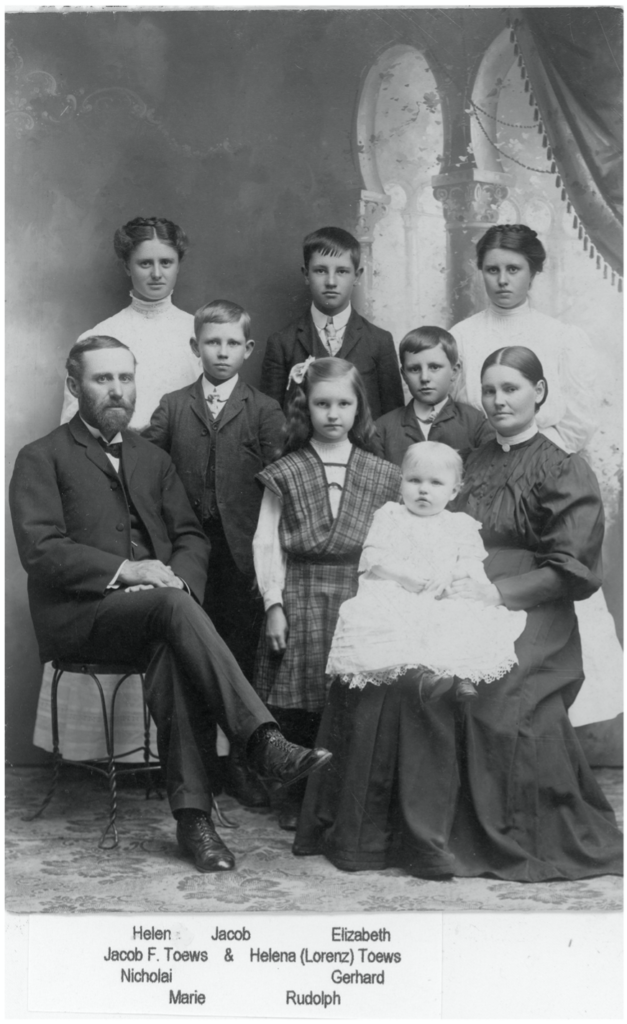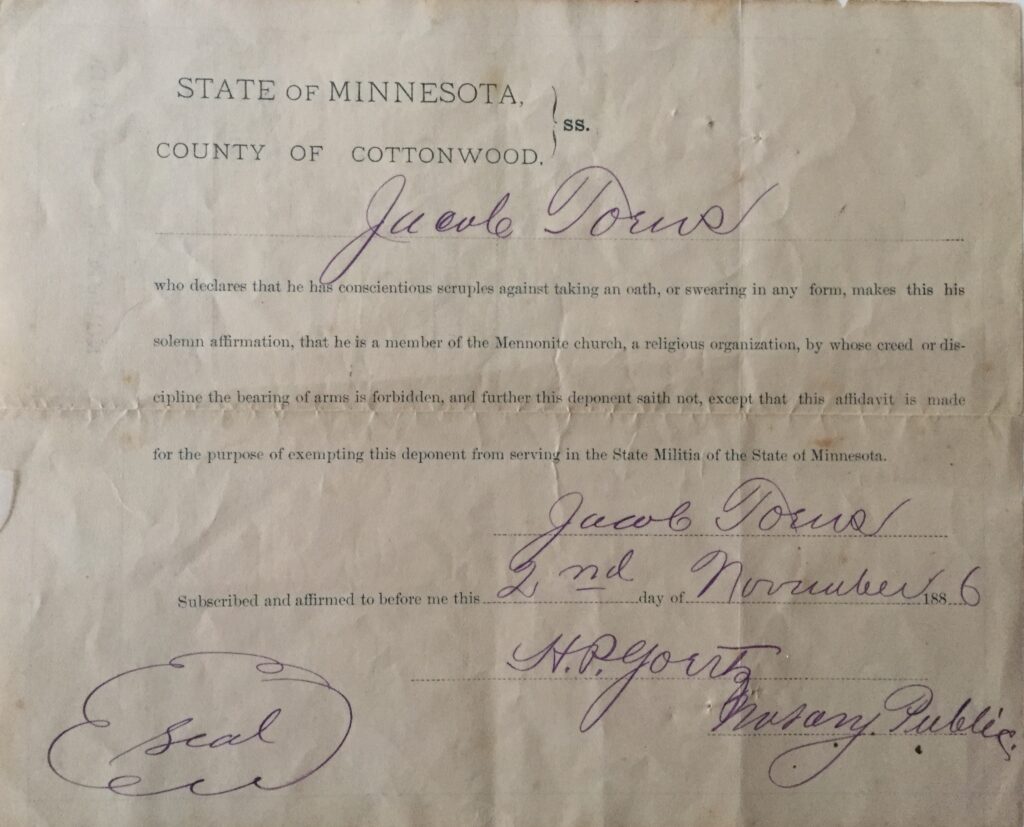In the previous post, Uncle Marvin mentioned that one of the distinctive tenets of the Mennonite faith was the refusal to bear arms. While in recent decades the Mennonite and Anabaptist position on this matter has been called pacifism, a better term for their perspective would be the stance of non-retaliation or nonresistance. The difference is that pacifism generally opposes the very idea of war, the use of force and the exercise of capital punishment. The historic position of nonresistance recognizes the reality of those practices and even the need for them in this fallen world, but maintains that Christians themselves should not be involved with carrying them out in any way.
Take, for example, the Schleitheim Confession of Faith expressing the beliefs of the Anabaptists. It was produced in 1527, written primarily by Michael Sattler of Stauffen, Germany. A Roman Catholic priest at one time, Sattler became a leader of the Swiss Brethren after his conversion. He was martyred for his beliefs the same year in which the Schleitheim Confession was published.
In contrast to the belief and practice of Roman Catholicism and of the reformers, the Anabaptist belief in nonresistance is set forth in the sixth of seven articles in the Schleitheim Confession, which reads:
Sixth. concerning the sword: The sword is ordained of God outside the perfection of Christ. It punishes and puts to death the wicked, and guards and protects the good. In the Law the sword was ordained for the punishment of the wicked and for their death, and the same [sword] is [now] ordained to be used by the worldly magistrates. In the perfection of Christ, however, only the ban is used for a warning and for the excommunication of the one who has sinned, without putting the flesh to death, -- simply the warning and the command to sin no more.
Now it will be asked by many who do not recognize [this as] the will of Christ for us, whether a Christian may or should employ the sword against the wicked for the defence and protection of the good, or for the sake of love.
Our reply is unanimously as follows: Christ teaches and commands us to learn of Him, for He is meek and lowly in heart and so shall we find rest to our souls. Also Christ says to the heathenish woman who was taken in adultery, not that one should stone her according to the law of His Father (and yet He says, As the Father has commanded me, thus I do), but in mercy and forgiveness and warning, to sin no more. Such [an attitude] we also ought to take completely according to the rule of the ban.
Secondly, it will be asked, whether a Christian shall pass sentence in worldly disputes and strife such as unbelievers have with one another. This is our united answer: Christ did not wish to decide or pass judgment between brother and brother in the case of the inheritance, but refused to do so. Therefore we should do likewise.
Thirdly, it will be asked concerning the sword, Shall one be a magistrate if one should be chosen as such? The answer is as follows: They wished to make Christ king, but He fled and did not view it as the arrangement of His Father. Thus shall we do as He did, and follow Him, and so shall we not walk in darkness. For He Himself says, He who wishes to come after me, let him deny himself and take up his cross and follow me. Also, He Himself forbids the [employment of] the force of the sword saying, The worldly princes lord it over them, etc., but not so shall it be with you. Further, Paul says, Whom God did foreknow He also did predestinate to be conformed to the image of His Son, etc. Also Peter says, Christ has suffered (not ruled) and left us an example, that ye should follow His steps.
Finally it will be observed that it is not appropriate for a Christian to serve as a magistrate because of these points: The government magistracy is according to the flesh, but the Christians' is according to the Spirit; their houses and dwelling remain in this world, but the Christians' are in heaven; their citizenship is in this world, but the Christians' citizenship is in heaven; the weapons of their conflict and war are carnal and against the flesh only, but the Christians' weapons are spiritual, against the fortification of the devil. The worldlings are armed with steel and iron, but the Christians are armed with the armor of God, with truth, righteousness, peace, faith, salvation and the Word of God. …
You will notice that the confession applies the teaching of nonresistance to the Christian in three ways: forbidding the bearing of arms, forbidding serving as judges in civil or criminal disputes, and serving in any civil/political office.
More than a century later, the Mennonite branch of Anabaptists developed their own confession of faith. The Dordrecht Confession of Faith was produced and adopted by the Dutch Mennonite Conference in Dordrecht, Holland, on April 21, 1632. Among the eighteen articles of this confession, the fourteenth reads as follows:
XIV. Of Revenge
As regards revenge, that is, to oppose an enemy with the sword, we believe and confess that the Lord Christ has forbidden and set aside to His disciples and followers all revenge and retaliation, and commanded them to render to no one evil for evil, or cursing for cursing, but to put the sword into the sheath, or, as the prophets have predicted, to beat the swords into ploughshares. Matthew 5:39, 44; Romans 12:14; 1 Peter 3:9; Isaiah 2:4; Micah 4:3; Zechariah 9:8, 9.
From this we understand that therefore, and according to His example, we must not inflict pain, harm, or sorrow upon any one, but seek the highest welfare and salvation of all men, and even, if necessity require it, flee for the Lord's sake from one city or country into another, and suffer the spoiling of our goods; that we must not harm any one, and, when we are smitten, rather turn the other cheek also, than take revenge or retaliate. Matthew 5:39.
And, moreover, that we must pray for our enemies, feed and refresh them whenever they are hungry or thirsty, and thus convince them by well-doing, and overcome all ignorance. Romans 12:19, 20.
Finally, that we must do good and commend ourselves to every man's conscience; and, according to the law of Christ, do unto no one that which we would not have done to us. 2 Corinthians 4:2; Matthew 7:12.
It should be noted that the Dordrecht Confession adds an emphasis on seeking the good of all people, including enemies. Even while refusing to bear arms, this element of their belief system has led them to be actively engaged in non-military and non-political endeavors even in times of war. For example, many Mennonites who conscientiously objected to military service in the United States during World War II were voluntarily, heavily occupied with other forms of service involving humanitarian ventures in such areas as medical care, health care, education and agricultural development.
One does not need to agree completely with the overall position maintained in either of these confessions’ articles to appreciate the obvious desire to live in obedience and conformity to Jesus’ example and commands. One does not need to adopt the overall position maintained in these articles to honor those Anabaptists and Mennonites who were martyred because of their refusal to compromise their beliefs and their consciences with respect to this and several other matters.
In fact, one of the Mennonites I appreciate for consistently living out his belief is my great-grandfather, Oma’s grandfather, Jacob F. Toews. Born in 1861, in Pordenau, Russia, Jacob F. Toews died on April 8, 1935, in Mountain Lake, Minnesota. In other words, not even Uncle Don can remember him!

Never having met my great-grandfather Toews, there are still two reasons I appreciate and admire him. The first and primary reason is because he raised Grandpa Jacob J. Toews (the young man in the center of the back row in the photograph), who has always been the man I have most admired among those whom I have known. The second reason is because I know that on November 2, 1886, Great-grandpa Toews as a Mennonite acted out his faith consistently—at least with regard to nonresistance.
Here’s the proof, front and back!

